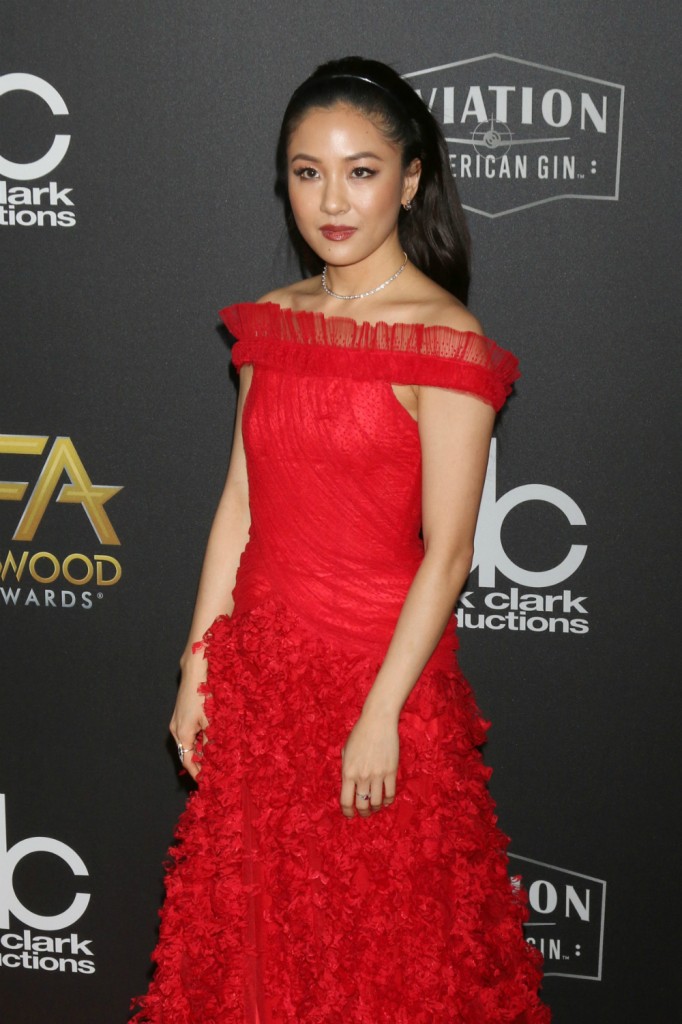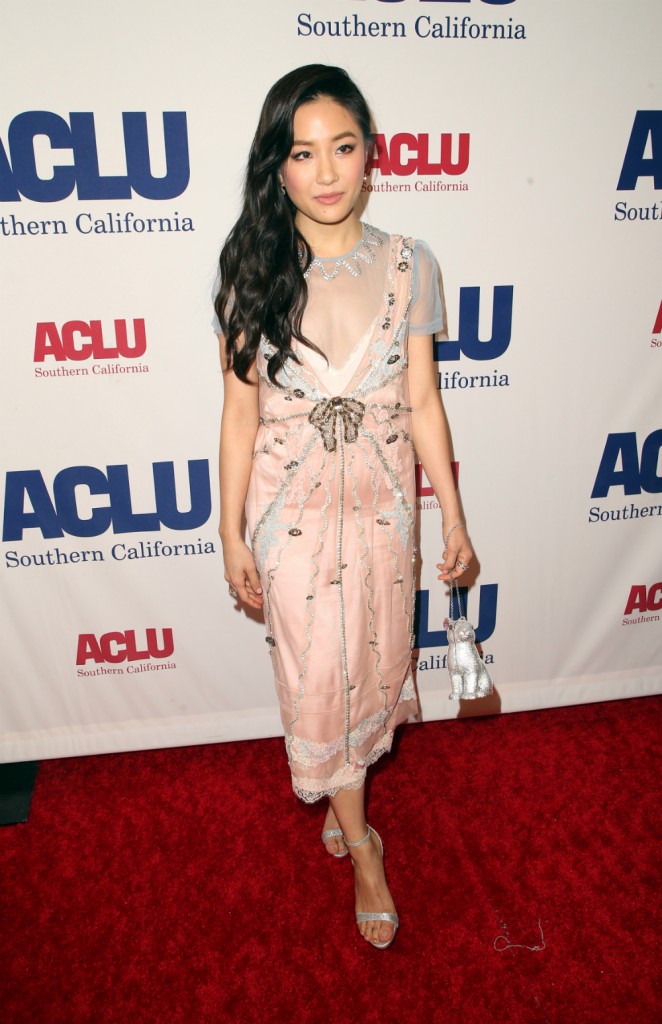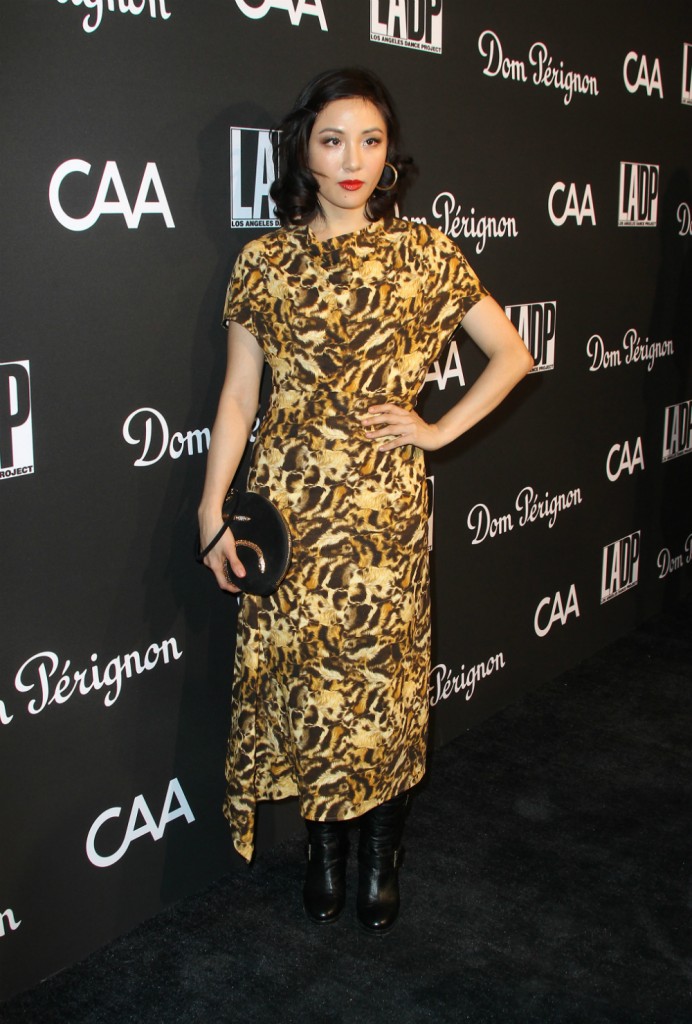I’ve mentioned before how happy I am about the success of Crazy Rich Asians. My mother liked the film so much she bought and read all the books in the series immediately after seeing it (which is doubly cool because she’s giving them all to me when I see her this week.) The lead in the film was Constance Wu who also stars on the comedy Fresh Off the Boat. Constance has been vocal about standing up for her community and representation. So it’s no surprise that she fought to front the first all-Asian cast in a film since Joy Luck Club. But fighting for it didn’t mean it was easy for her to land the part. Constance discusses another layer of exclusion that I, for one, hadn’t considered: auditioning. Auditioning is really hard for anyone. But if you rarely get the chance to audition, it can be especially daunting.
“I actually let the part go, because I met with [director Jon M. Chu] and I was like, ‘I really want to do this, but I can’t, because I’m under contract with my show and we shoot in the fall,’” the Fresh Off the Boat star explained during a panel discussion at the Vulture Festival.
“I was like, ‘Cool, another actress will get that and I will be 100 percent behind her because I want there to be more Asian actors out there,’” Wu, 36, continued. “So I kind of let it go.”
The Virginia native then went on to note the surprising moment she decided to reach out and try to make it work. “I was on an airplane,” she said, noting she “was sitting next to somebody” who made her think, “Wow, life is too precious right?”
“So I wrote this email on the plane to [Chu],” she dished. “[I was like,] ‘Listen, I know the schedules don’t work out, whoever you end up putting in the movie … I want to support you, but I would be remiss if I didn’t tell you what this means to me and why.”
However, just because Chu, 39, liked Wu’s enthusiasm to make the scheduling work didn’t mean she got the part without auditioning.
“Oh, my God. I was threatened,” the Virginia native recalled. “Asian Americans don’t often get the opportunity to audition for a lead role, so that in itself is a setback because white actors have the opportunity to practice auditioning in charged situations. If they don’t get that part, they’ll probably audition next week. So it’s not as precious as somebody who gets to audition maybe once a year, maybe once in their lifetime.”
I remember hearing about her letter to Jon Chu when she was interviewed by Stephen Colbert last August. I made a note of it as a good example of fighting for something you want. The part about the person next to her on the plane is a new bit of information, I kind of want to hear more about what happened. In that same Colbert segment, she discussed another audition in which she pretended she knew how to speak Korean (4:20 mark).
Part of understanding my white privilege is to recognize how little I know of the complexities of discrimination. Reading Constance’s comments about auditioning more infrequently than white actresses makes perfect sense once she said it, but as I said, I’d never thought of it before. I recognize that it’s not Constance or anyone’s responsibility to educate people like me what systemic changes need to be made to work towards equality. That is why I am so grateful they are still willing to do it.
And congrats to Constance for nailing the audition.
Photo credit: WENN Photos















Same goes for us in the “real world”. When you have an “ethnic name” it’s so hard to get a job interview. Once you finally land an interview, you’re so nervous because of lack of practice. It’s not like you’ve been on many interview, you never get called for one ! I remember getting a call for an interview and being so excited and scared. The woman interviewing me was White. She was so interested in my culture that she asked me questions I think were illegal lol…but I answered because I was just so happy to get an interview. I got the job…entry level. After a while working there, my boss was leaving and they needed to fill her spot ASAP. They never told me or approached me. They hired a clueless woman (who happened to be White) who I basically had to train ! This woman didn’t even know how to use “google”. How she got that job I”ll never know. Anyways, I left and went on to earn a Master’s degree. I think still only got offered jobs where my supervisors were less educated than me ! So frustrating when I’m doing all the work but getting paid less ! But you suck it up and keep going.
Oh @Hecate thanks so much for this: “I recognize that it’s not Constance or anyone’s responsibility to educate people like me what systemic changes need to be made to work towards equality. That is why I am so grateful they are still willing to do it.” People don’t often realize the toll of continuing to be willing to educate others. Often when you do you get half the people who want to argue with you about how facts aren’t facts (the genocide of Native Americans’) or over-romanticize you (your cheekbones! can I touch your hair?) – but somehow it continues to be worth the effort for the ones who get it.
This happens a lot in my sister’s field. She’s in international development and gets passed over for white men and women who have a lot less experience than her. Mind you she’s worked in Darfur, different parts of Iraq etc. she has a masters, tons of experience and works like crazy. But it’s never enough. I’d like to also point out the people hired tend to be clueless about the culture and look down on the people they’re supposed to be helping. She’s living in an Arab country right now and they whites working there have an FB page specifically excluding Arabs. She had to vouch for my brother for him to be added to the page.
Always something to learn on this website! Who’d a thunk it? A celebrity gossip website?! Thank you to the authors & commenters.
As an ethnic girl hell yes it’s tough out there
When I went to go watch crazy rich asians though I remember being so excited. I’m not from the same place as the movie was filmed in but it felt so exciting to be watching a movie with a diverse cast. I felt the same when I went to go watch black panther.
BUT I honestly felt a little but uncomfortable at some parts in the movie. I’m brown and people in my family wear turbans and I know there is a huge percentage of population there who are brown and wear turbans. I understand that the movie was only focusing on specific families but I really felt uncomfortable that the only time brown turbaned people were shown were in a lower income working capacity. It felt strange that a movie that knew it was inspiring diversity was instead putting another group of people in a box. Anywho I don’t know if anyone else felt like this but I really needed to get that out.
That’s a very interesting point. I wonder if that’s part of the socioeconomics of Singapore? Who does the manual labor?
“Part of understanding my white privilege is to recognize how little I know of the complexities of discrimination.”
Thank you for saying this. More white people need to understand this statement.
First of all, I think people have forgotten Memoirs of a Geisha, starring Ziyi Zhang, Michelle Yeoh, Gong Li, Ken Watanabe, etc. Just sayin’. There should be more Asian films in Hollywood, but please don’t forget Memoirs of a Geisha (mainly bec it’s one of my favorite books).
Long, long time reader, first time commenter. I apologize in advance for the tone, but I’m feeling a little worked up.
The fact that you’ve put CRA and Memoirs of a Geisha into the same category shows exactly why we need more movies like CRA, which is notable for 1) putting Asian AMERICANS in its lead roles and 2) its representation of a DIVERSITY of Asian experience, including the Asian Americans who are hardly ever represented on screen. Memoirs of a Geisha (which was written by a white man who appropriated the experience of an actual geisha against her wishes) is a movie about Japanese people. There are certainly similarities between Asians and Asian Americans (and other Asian diasporic communities), but they ultimately have different sets of experiences. To put CRA and Memoirs into the same category is akin to conflating all people of Asian descent into a single “Asian” category, something that Asian Americans (treated like perpetual foreigners, as if their allegiance and cultural ties are primarily based in some perceived Asian homeland) must face every day and which CRA, most significantly, actively portrays.
Just wanted to say I finally watched CRA and I wished I could have given them my money in theatres. But a good babysitter is hard to come by. What a great, happy inducing movie.
And as for fighting for what you want who knows what would have happened if I took no as the answer when i applied to graduate school. I was ready then if i took that no, who knows if i would have been able to go back a year later and try again. I fought, I wrote letters, campaigned, got reference letters, and took an entrance exam that they would accept as proof of my aptitude for graduate studies. All within the 5 weeks before classes actually started.
It was actually one of my greatest accomplishments